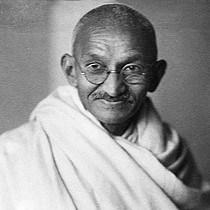Gandhi’s Approach to Loving Your Enemy

Reader Responses
How do you prepare your body and spirit for a difficult conversation or interaction?
How do you remain loving during conflict?
This morning I had to prepare for a difficult conversation with a neighbour's landlord. To start with I practised breathing deeply. Then I thought about Quaker integrity and that of God in everyone. The conversation went well.
Chris M., Leicester, UK
In my work, I am fortunate to have some training and experience as a coach, working with organizational leaders. When personal conflict arises, I can turn to that coaching toolbox for the greatest tool of all: Curiosity in the form of genuine, open-ended questions. First for myself; then for the person I'm in conflict with.
It's so easy to make a conflict worse than it needs to be by making assumptions about the other person's intention, meaning, etc. When I'm at my best, I prepare for conflict by asking myself questions about my own assumptions: What am I assuming that I don't actually know? How do my assumptions serve the relationship (they usually don't!)? How can I challenge/change my own assumption(s)?
Then I think about what questions I want to ask the other person. I listened to a wonderful interview with Professor Loretta Ross on Adam Grant's ReThinking podcast this week, where she differentiated between initiating conflict by "calling out" versus "calling in." The former is the classic way we shame and cancel one another in society at large. The latter is done with love, humility, and a recognition that — in any conflict — the only perspective or behavior change we can control is our own. Influencing others must begin by setting aside shame and discovering the humanity in the person who shares the conflict with us. I love this framing. I fail to do it quite often; but it's nonetheless what I strive for.
Audrey C., Oslo, Norway
Quakers say
“There is that of God in all persons”
Do I see, name, and celebrate
the Divine in those I encounter?
Can I bring curiosity
for the Divine,
an attitude of wonder
to all I meet?
Do I enter a still Spirit
and calm breath
As we draw near?
Can I become
Sanctuary for the other
Embracing their Goodness?
William M., League City, TX, USA
I try to remember to observe rather than evaluate an interaction, as Marshall Rosenberg suggests in his book Nonviolent Communication. I find that if I shift my thinking from only meeting my own needs to acknowledging that the other person is trying to meet their needs too, I can be more empathetic. Rosenberg says that shift helps us see our common humanity: "The more we hear them, the more they'll hear us." Being heard is often the only thing we need and is the key to moving from judgement to mutual understanding.
Kathy H., DeLand, FL, USA

This Week’s Messages
Mon Feb 03
Mary Dyer at the Scaffold
Cursed Quaker, repent and drive the Devil from this Land. / Thus Minister Wilson cajoled Mary Dyer at the scaffold. / She preached the Kingdom of Heaven is at hand. Do you wish the elders to pray for you? / She said I desire the prayers of all God’s people. / Cursed Quaker, repent and drive the Devil from this Land …
Tue Feb 04
What Fierce Love Calls Us to Do
“In every way and in every place, we must work to eliminate the scourge of hate that leads to violence and promote the bonds of love that establish justice and that lead to peace. To realize this, we must also hold people accountable for violating laws and hold lawmakers accountable for perpetuating lies […]” …
Wed Feb 05
We Ourselves Are Part of the Oppression
“The duty of the Society of Friends is to be the voice of the oppressed but [also] to be conscious that we ourselves are part of that oppression. Uncomfortably we stand with one foot in the kingdom of this world and with the other in the Eternal Kingdom. Seldom can we keep the inward and outward working of love in balance, let alone the consciousness of living both in time and in eternity, in timelessness.” …
Thu Feb 06
Quaker Testimonies Are Made for this Hour
“Concentrations of money and power in industry and in the military, the vast influence of the mass media, and seemingly insoluble nature of the problems confronting the world all combine to make us feel we are helpless victims of circumstances beyond our control. Why, then, should we bother to try to speak out? Why should we spend precious time and energy on what appears to be a futile effort to influence the course of events? And if we do speak out, will anybody listen?” …
Fri Feb 07
I Ask for Strength, but Not for Power
I ask for daily bread, but not for wealth, lest I forget the poor. / I ask for strength, but not for power, lest I despise the meek …
Sat Feb 08
What to Do Against a Strong and Violent Adversary
“When a position is taken against a strong and violent adversary, it will be necessary to be firm as a rock, fully prepared to suffer any consequence rather than yield to evil… Firmness, like that displayed by the early Christians and Friends and followers of Gandhi, is impossible in the presence of fear or doubt. It comes only from faith – the deep conviction that the position for which one stands is part of the eternal truth; that being true, it will survive and can be brought into expression by those who will uphold it at all cost.” …
Banner image: Zan Lombardo
Read the source of today’s quote





